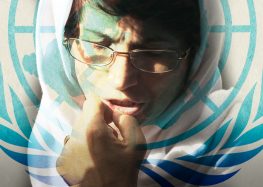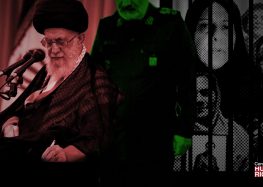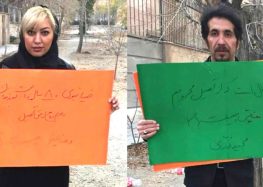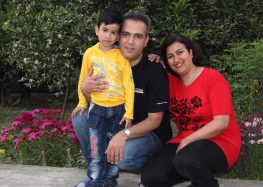Allow Peaceful Celebrations of National Student Day
Appendix I the list of 201 detained students of past 18 months
Appendix II list of 161 students suspended or expelled since March 2007
—————————————-
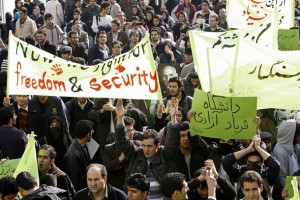 End Rampant Violations of Academic Freedom and the Right to Education
End Rampant Violations of Academic Freedom and the Right to Education
(5 December 2008) Despite three years of persecution and prosecution and increasing threats from official organs against university students, the voices of Iranian students promoting academic freedom on university campuses and the right to education are strong and clear, the International Campaign for Human Rights in Iran reported on the eve of National Student Day, 6 December.On 26 November 2008, Mehdi Arabshahi, secretary of the Office to Foster Unity, a prominent student organization, reported threats against his organization being circulated in publications and websites close to the government. According to these threats, the Office to Foster Unity is being accused of connections to terrorist groups abroad. Arabshahi strongly denied these accusations and announced that despite such intimidation tactics, the organization will celebrate National Student Day and hopes their peaceful events will be allowed to take place.
“Student activists always hope to hold their events honoring this day in a calm and peaceful environment so they can exercise their freedom of expression. But their gatherings have been violently broken up in recent years,” said Hadi Ghaemi, the spokesperson of the Campaign.
During the past year and a half at least 200 students have been detained (See Appendix I) and at least 160 students have been suspended from continuing their education or expelled from universities (see Appendix II).
Last year, on the occasion of the National Student Day, student activists paid a heavy price for their attempts to celebrate. Security and intelligence agents targeted students at their homes and in their classrooms prior to planned gatherings across the country, including in Tehran, Babolsar, and Mashad.
Detentions and Prosecutions
Widespread detentions of student activists started on 1 December 2007, and lasted for the next 45 days. As many as 65 students were detained and subjected to torture and ill-treatment. Eventually they were released after posting heavy bails. Even after their release, the former detainees were subjected to threats, intimidations, and continued interrogations. Many were suspended from further studies. Court sentences have been issued in some of the cases and others are awaiting sentencing.
Mohammad Saleh Ayoman is one of the student activists who were detained last year. A political science major at Tehran University, Ayoman and three other Kurdish students were detained on the street after they left a public lecture in honor of National Student Day at Tehran University on 8 December 2007. He was held in detention for 92 days at Evin Prison and subsequently released on $80,000 bail (80 million toman). His trial was held behind closed doors in October 2008. Branch 28 of Tehran’s Revolutionary Court sentenced him to four years in prison. He was also expelled from the University. The charges filed against him explicitly include participation in gatherings to honor National Student Day, acting against national security and gathering and collusion to disturb national security.
In the past year and a half, the authorities have detained at least 200 students advocating for academic freedom and freedom of expression, assembly, and association. Many have been tortured and ill-treated in detention.
In one case, a student detainee died nine days after detention. On 6 January 2008, intelligence agents detained Ebrahim Lotfollahi, a student at Payam Noor University in Sanandaj, studying law. His family was informed of his death without having the right to see his body. The authorities prevented an autopsy and buried him without the presence of his family.
Other students who have been sentenced continue to languish in prisons. Yaser Goli was sentenced to 15 years in prison and Habibollah Latifi has been sentenced to execution. Both Kurdish students were prosecuted in unfair trials and charged with having connections to armed groups.
The situation of three student editors at Amir Kabir University, Majid Tavakoli, Ehsan Mansouri, and Ahmad Ghasaban, illustrates the repressive environment on university campuses. The students were detained in May 2007 after the appearance of copies of falsified publications in their names , which insulted the authorities. They immediately disavowed any involvement in the publication of the controversial papers. Nonetheless, they were detained and held in Evin Prison, even though they were acquitted in court.
Since their release, they have been barred from registration to continue their studies. According to published reports by the above three students and their families, they were subjected to 38 cases of physical torture and 15 cases of psychological abuse while in detention. They reported extensive physical beatings including using whips and chairs to inflict pain; intensive blows on the face, head, and back; lifting off the ground by pulling hair; as well as lengthy interrogations lasting as long as 48 continuous hours.
As recently as 27 November 2008, security forces were reportedly searching for Majid Tavakoli to detain him. On that evening, eyewitnesses reported that four individuals broke into Tavakoli’s home and searched it. No one was in the house at the time.
“The situation of universities is a reflection of the human rights situation in the broader society,” said Ghaemi. “When students seeking their most basic rights are persecuted and prosecuted to such an extent, it shows how the rights of all citizens to demand their legitimate rights are severely curtailed.”
Denying the Right to Education
The right to education is an internationally recognized right* and is explicitly enshrined in Iran’s constitution. However, since 1980, when the Supreme Council for the Cultural Revolution was formed, it has been extensively violated. In the past three years, these violations have considerably increased with a coordinated assault by the Ministry of Higher Education, Intelligence Ministry, and the Judiciary, aimed at depriving student activists from continuing their higher education.
As recently as 25 November 2008, four students, Mahdavieh Golroo, Saeed Feyzollah, Majid Dari, and Sadegh Shojaii, who were suspended from continuing their education due to their public criticisms, staged a protest sit-in at Alameh University in Tehran. They demanded their right to return to their classes and resume their studies. Security forces detained the protesting students. They were released on personal assurances on 2 December 2008.
Since fall 2006, disciplinary committees on university campuses have routinely summoned dissident students and sentenced them to suspension terms. The increasing use of such committees to deprive students of their right to education—in violation of Iran’s international legal obligations– is aimed at intimidating the student body throughout the country. Suspension sentences ranging from one to three semesters have been issued. In many cases, university officials did not even honor their own regulations and issued sentences in absentia without providing students a chance to defend themselves or become aware of the reason for their suspension.
The International Campaign for Human Rights in Iran has compiled a list of 160 students who have received suspension sentences since 2007(see Appendix II).
In some cases, students have received multiple suspension sentences, effectively resulting in their expulsion. Esmael Salmanpour and Abbas Hakimzadeh, two students at Amir Kabir University, received suspension sentences for two semesters on 7 July 2007. Both students had earlier been sentenced to another one-semester suspension. As a result, neither was able to complete their studies within allotted periods and they were de facto expelled. In Tabriz University, Babak Rahmati, editor of the Goonesh student publication, facing the same multiple suspension sentences has been unable to complete his studies. Rashid Esmaeli, studying toward his Master’s degree in Human Rights at Alameh Tabatabai University, was suspended for four semesters. As he was due to defend his dissertation and receive his degree, his suspension has effectively led to his expulsion.
Many former student detainees, upon their release and return to their campuses, have faced obstacles to continue their studies, including expulsions. Hadi Hamidi Shafiq, an Azerbaijani student, spent 17 months in prison, from December 2006 to May 2008. After his release, he was not allowed to complete his studies and was expelled because the officially- allowed duration for his studies had been exhausted while he was in prison. Farzad Hasanzadeh and Towhid Dowlatshenas, two students at Ferdowsi University in Mashad have been expelled following several detentions. Soheil Asefi, a journalist completing his studies at Sureh University, was detained in August 2007 and released after 60 days on $100,000 bail (100 million Toman). After his release, he was expelled from the University. Mohammad Saleh Ayoman, a political science student at Tehran University, was prosecuted for participation in a National Student Day gathering in December 2007, sentenced to four years in prison, and subsequently expelled from the University.
Other student activists have been expelled directly by disciplinary committees or the admissions bureau of the Ministry of Higher Education. Karoo Sadighiani, a master’s student in Mechanical Engineering at Tehran’s Science and Industry University, was expelled on 23 February 2007 by order of the Ministry of Higher Education. He was only three months away from graduation. The Ministry also barred him from taking the university admissions exam for one year. Sadighiani is student activist, and as an undergraduate at Razi University in Kermanshah, he founded the Democratic Union of Kurdish Students. He has reported that for a period of one year prior to his expulsion, officials at the Ministry of Higher Education continuously intimidated and pressured him into making false and baseless confessions. During these sessions, he was threatened with expulsion and informed that his only option was to make such false confessions. He considers the entire process leading to his expulsion order illegal and without any basis in evidence against him.
Milad Asadi, a student at Khajeh Nasir University, was recently suspended for two semesters. On 18 October 2008, Asadi held a protest sign during a lecture by a member of the Supreme Council for the Cultural Revolution, Mr. Arghazdi. He was immediately summoned by the Disciplinary Committee and given a two-semester suspension sentence. He told the Campaign: “The Ministry of Higher Education has become a security agency instead of following its mandate to improve the academic situation on university campuses. The bulk of its activities are focused on watching and controlling student activities and organizations. It summons students and gets involved in the most private aspects of students lives, from their clothing to how male and female students interact.”
In addition to suspensions and expulsions of student activists, the student body, in general, is under tremendous pressure from disciplinary committees for their social behavior and dress codes. In one case, according to the Chancellor of Karaj Azad University, the University’s Disciplinary Committee summoned 93 students because of their clothing, leading to 13 suspensions, while the remaining students received official reprimands in their records. In January 2008, 30 students at the Dentistry College of Shiraz University were suspended from their studies because they had participated in a private party with both male and female students present. The Disciplinary Committee issued its ruling based on film footage of the private gathering obtained with a hidden camera. Although the private domain of students was protected under the law, the Committee did not hesitate in issuing its ruling.
The adverse effects of such pressures on the student body have led to disastrous outcomes including several suicides attributed to actions of disciplinary committees in 2007 and 2008. Salar Behrozian, a third year political science major at Shiraz University was reportedly accused of holding dissident views and was unfairly given low grades by faculty members close to the University’s management. Under threat of suspension, he reportedly committed suicide. A female student at Lahijan Azad University committed suicide, reportedly after being summoned multiple times by the Disciplinary Committee. A similar incident, leading to the suicide of another female student at Sistan and Balushistan University, has also been reported.
Many student activists and dissidents have been deprived of enrolling in graduate programs. In the 2006-2007 academic year, 17 students were prevented from taking the graduate entrance exams because authorities questioned their “ideological commitment.” Another 140 applicants were allowed to take the entrance examination only after signing “commitment letters” affirming that they would not participate in any student activities during the duration of their studies.
During the past academic year, this trend intensified to include dozens of students. Students barred from enrollment attempted to obtain their academic records to demonstrate their merit for enrollment in graduate programs. However, the authorities denied them access and thereby also prevented the students from legal recourse.
The names of 45 students among those barred from enrollment in graduate programs are: Saeed Adeshiri, Mehdi Aminizadeh, Zahra Janipour, Hamed Hassandoust, Farhad Zat Allifar, Mohammad Hosein Hasanpour Bisheh, Roozbeh Riazimoghadam, Salar Saket, Gharib Sajjadi, Peyman Aref, Hanan Azizi Banitorof, Mohsen Fatehi, Siamak Karimi, Shooresh Moradi, Zahra Tohidi, Morteza Husseinzadeh, Alireza Khooshbakht, Yahi Safi Aryan, Zohreh Asadpour, Vahid Pour-Esmaeli, Abed Tavancheh, Yaser Goli, Ali Saberi, Nasr Pouria, Nader Mahd Gharehbagh, Amin Emami, Samad Pashaii, Nahid Babazadeh, Seyd Ziaoldin Nabavi, Seyd Hamed Ahmadi, Towhid Alizadeh, Asghar Ghanbari, Hanif Karagari, Ali Taghipour, Amid Moshrefzadeh, Shiva Nazarahari, Yashar Ghajar, Farshid Moghadam Salimi, Hossein Najafi, Adib Rostampour, Mehdi Khalili, Pouyan Mahmoudian, Sivan Bahmani, Ali Hosein Asadzadeh and Afshin Akbarian.
Denial of the right to education is not limited to student activists and dissidents who have been persecuted for their opinions and political views. According to several decisions passed by the Supreme Council for the Cultural Revolution, students have been deprived of their right to education also based on their religion and beliefs, gender, and place of birth.
According to the Iranian constitution, religious minorities have a right to primary education. However, the Baha’i faith is not an officially recognized religion in Iran. Baha’i children and youth suffer from severe discrimination in primary schools. Under regulations passed by the Supreme Council for the Cultural Revolution, Baha’i students are banned from enrollment in higher education institutions. If a Baha’i student manages to pass the national entrance exam and enroll at a university, upon discovery of his/her faith, she/he is subjected to immediate expulsion. Following intense international inquiries about the situation of Baha’is in higher education, the Ministry of Higher Education claimed that registration forms do not ask for a student’s religious affiliation, but only to determine what religious studies they will be subjected to. Subsequently about 200 Baha’i students managed to enroll in universities. However, as of August 2007, 128 Baha’i students were identified and expelled.
In September 2007, as many as 800 Baha’is who took the national entrance examination were not able to complete their registrations. Upon further inquiry, they were told their files were “incomplete.” As the Baha’i students’ attempts to “complete” their records failed to resolve the issue, officials at the Ministry explicitly informed them that they would not be able to register because of their Baha’i faith. They were told that the determination was made through national records.
Since the beginning of the Islamic Republic, discrimination based on gender has been implemented in university admissions processes by restricting what majors are open to female students. This trend had considerably slowed over the years, but as the number of female students increased, discussions about limiting their participation resurfaced in 2002. The Organization for Measurement and Admissions put forth a plan for limiting admission to certain programs, such as medicine and engineering, based on a gender quota, instead of academic merit. At the time, following protests by parliamentarians, student activists, and women’s rights defenders, President Khatami did not implement the proposal.
However, in March 2008, the Organization for Measurement and Admissions announced a quota system for medicine and engineering programs that it said aimed to ensure between 30 to 40 percent representation of both genders. The authorities justified their plan as a way to keep gender balance in various departments and also to address the fact that male students do not take the entrance exams at the same stage as female students because of the male students’ obligation to perform mandatory military service for two years. According to published reports, in 2007, the gender-based quota system had been applied to 26 degree programs, and this number rose to 32 programs in 2008. Student and women’s rights activists have strongly protested the quota system. Due to the complexity of the admissions process, it is not possible to determine how many female students who were academically qualified to register for a particular degree program have been deprived of this opportunity because of the quota system. However, in individual cases, when admitted female students have compared their performance in the admissions exam with their male classmates, they report a widespread discrepancy between their academic merits.
An alarming manifestation of gender discrimination is legislation proposed by the parliament to the Supreme Council for the Cultural Revolution in fall 2008. It requires that female students mainly be admitted to universities in their home towns and denies many of them the right to enter national elite universities, which are mostly based in a few large cities. It also limits academic programs available to female students since many regional universities do not offer a wide range of academic programs, thereby depriving them of equal access to educational opportunities. The legislation is in violation of article 21 of Iran’s constitution that requires promoting the status of women in society. Women’s rights activists have strongly protested the proposed legislation. Although it has not yet been made into law, its strong defense by parliamentarians who brought it to the floor demonstrates a determined will to pass it. The legislation also requires parental consent for female students who manage to enroll in universities away from their hometown, a serious violation of students’ right to privacy and of their independence as adults.
Another government action that has violated equal access to higher education is a regulation by the Supreme Council for the Cultural Revolution to limit admissions of all students mainly to universities in their home towns. This regulation was implemented in the admissions process for the 2008-2009 academic year. As a result, a large number of applicants with high ranks in the national entrance exam were deprived of enrolling in elite universities of their choice, simply due to their place of birth and residence. Following widespread protests, on 9 September 2008, 172 members of the parliament lodged an official inquiry to the Minister of Higher Education. This action resulted in the Ministry increasing the number of admissions to elite universities by 10 percent. But the process remained opaque and it is not clear on what criteria additional applicants were allowed to register as part of the 10 percent increase in admissions. It has been reported that as many as 300,000 applicants who took the national entrance examination in 2008 have lodged complaints with the National Inspections Organization.
In an open letter on 15 October 2008, 109 university professors expressed their concerns about the academic situation of the universities. In addition to noting persecution and prosecution of student activists, dismantling of their organizations, gender-based discrimination, and forced retirements of faculty members, the authors outlined the effects of such policies on the academic community and the broader society. The letter pointed out that the existing policies stem from a tendency in which “the universities are viewed as dependent, inactive entities that require constant interference by governmental agencies and must be kept under the control of non-academic organs.”
Purging of Faculty
In the past three years, the job security of the faculty has been greatly eroded by a wave of forced retirements. In addition, the freedom to teach academic texts and choose one’s area of research, which are fundaments of academic freedom, have been threatened, particularly in social science, humanities, and law departments.
The wave of firings and forced retirements of faculty began in 2006, after a speech by President Ahmadinejad who called for the purging of universities of secular and liberal professors. Subsequently, Hassan Namakdoust Tehrani, a professor of communications at Alameh Tabatabai University, was fired. During this phase, most dissident faculty who had never been hired as full-time faculty were purged, including Mohsen Kadivar, Hashim Aghajari, Masoud Ghafari, Hatam Ghaderi.
In June 2006, a number of well-known professors, mostly from political science and law departments, were forced into retirement. Some of the faculty forced into retirement in June 2006 include: Dr. Doroorian, civil law; Dr. Raiis Tusi, political economy of oil; Dr. Saii, Third World politics; Dr. Mojtahed Shabestari; Dr. Iraqi; Dr. Safaii; Dr. Amir Naser Katouzian and Dr. Mahmoud Erfani, both well-known experts in criminal , civil, and commercial law; and Dr. Homayoun Elahi, expert in Middle East and Persian Gulf. In addition the following literature professors have been forced into retirement: Dr. Karim Mojtahedi; Dr. Ali Sheikhaleslami; Dr. Gholamhussein Ebrahimi Dinani; Dr. Mohammad Reza Shafii Kadkani; Dr. Reza Davari; Dr. Mohsen Jahangiri; and Dr. Ebrahim Bastani Parizi. In addition, 30 faculty members from Alameh Tabataba’I University have recently been forced into retirement; their names have not yet been made public.
Dr. Hussein Bashirieh, professor of political science and sociology; Dr. Hadi Semati, professor of international relations; and Dr. Behrouz Shahandeh, professor of Chinese and Far East history were expelled with the excuse that they overstayed their sabbaticals while teaching and doing research abroad. Dr. Bashirieh has said that his income had been stopped one year prior to his firing.
A number of faculty have also been fired because of the content of their teachings. They include Dr. Zarrin Kalak; Dr. Pouya Negari; Dr. Hassani-nia; Dr. Jamshid Ghashang; and and Esfandiar Zolghadr.
Abbas Hakimzadeh, a student suspended from education at Amir Kabir University and a member of the central committee of student associations of the Office to Foster Unity, explained the demands of students on the eve of National Student Day: “ The focal concerns of the Office to Foster Unity are clear: opposing gender-based quotas, suspending and expelling students, and forced retirements of the faculty members. We also note the terrible economic hardships of the people, the terrible social conditions, and the repression of social movements including women’s rights, students, and teachers movements. We cannot comprehend why government media accuse us of connection to terrorist groups. These charges, despite widespread detentions and prosecutions, have never been proven. The reason is such presuppositions are used only as a method of repression and have no roots in reality. We are only students who are aware of our and other people’s rights. It is the academic community’s responsibility to be on the forefront of rights movements. It is a sign of maturity of the student movement that despite all the violent repressive measures, they are still pursuing peaceful and civil means for attaining their basic rights.”
The International Campaign for Human Rights in Iran, affirming the rights of members of the academic community in education, teaching and research, and their freedom of expression, association and assembly, as well as the basic right to education, called on the Iranian authorities to immediately engage in serious consultations with representatives of faculty and students to reinstate their freedoms and to restore a calm, productive and depoliticized environment on campuses.
*The Right to Education is recognized by Article 26 of the Universal Declaration of Human Rights and Article 13 of the International Covenant on Economic, Social and Cultural Rights

